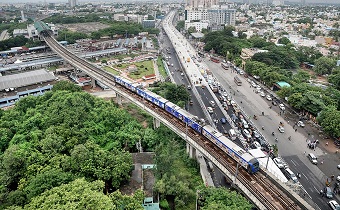The Madras High Court has called for suggestions from Chennai Metro Rail Limited (CMRL) on the list of bona fide reasons for which it could share its closed circuit television (CCTV) camera footage with those who seek it under the Right to Information (RTI) Act of 2005.
Justice Anita Sumanth asked senior counsel P.S. Raman, assisted by CMRL’s counsel-on-record Jayesh Dolia, to circulate by April 5 a list of suggestions on how such a mechanism could be conceived and put in place. The judge said, at times, such footage could be of great help to the citizens.
The orders were passed on a writ petition filed by CMRL challenging Tamil Nadu Information Commission’s (TNIC) direction to provide CCTV footage of the incidents that had been captured on a camera installed at Park Metro station between 10 p.m. and 10:45 p.m. on October 6, 2019.
The TNIC had also imposed a cost of ₹25,000 on CMRL for not having provided a satisfactory reply to the RTI applicant V.K. Mutharasu for over one year. Assailing the directions, Mr. Raman argued that there was a possibility of serious security threat if CMRL was forced to share CCTV footage with every other RTI applicant.
Stating that nearly one lakh CCTV cameras would be in operation after the CMRL completes phase II, the senior counsel said, someone with an ill intention could file multiple RTI applications seeking CCTV footage of different stations and then piece them together to learn the entire operations of the metro.
He also cited a Supreme Court judgement in Pradyuman Bisht versus Union of India (2015) wherein it was held that the CCTV footage from court campuses could not be provided to all applicants under the RTI Act without the prior permission of the presiding officer concerned.
Finding prima facie force in his submissions, Justice Sumanth granted an interim stay of the TNIC’s order. She also ordered notices to the commission as well as the RTI applicant returnable by April 5 and said that the applicability of the apex court verdict to the present case would be decided later.
However, taking note that the public had open access to Metros and that, in the larger interests of the citizenry, there must be some mechanism providing for retrieval of camera footage when needed for bona fide purposes, the judge asked Mr. Raman to come up with appropriate suggestions.








